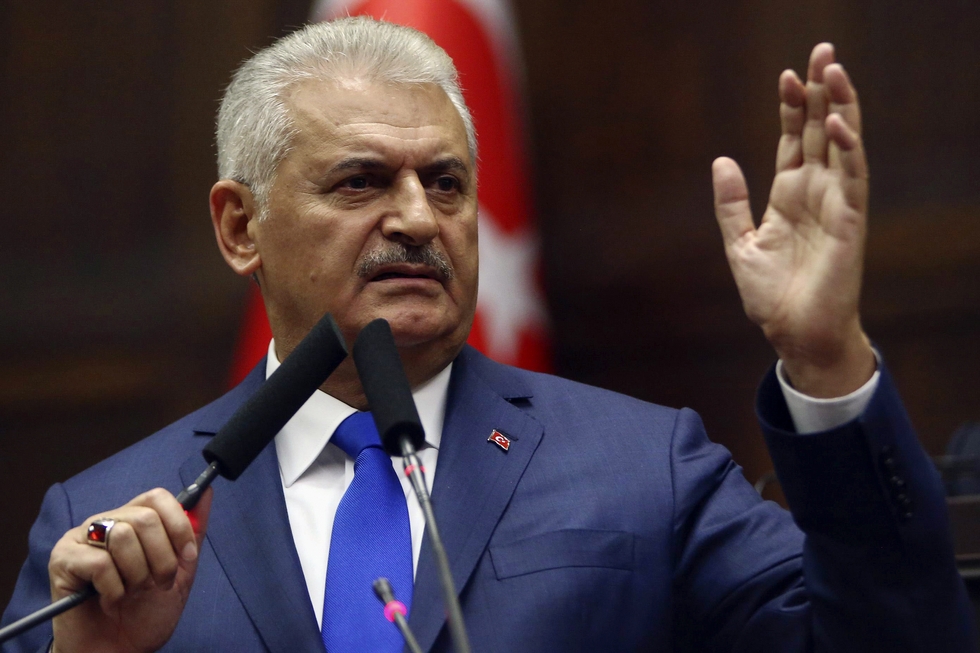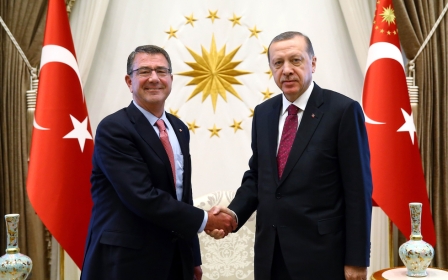Turkish PM blasts Iraq and EU as tensions rise amid warming Russia ties

Turkish Prime Minister Binali Yildirim on Saturday criticised Iraq's leadership, saying it was "being provocative" with recent comments and said Ankara will continue to have a presence in Iraq.
Speaking to a conference of his ruling Justice and Development Party (AKP), which is being held this weekend in western Afyon province, Yildirim also warned the EU not to forget that Turkey has alternatives to the bloc, whose ties with Ankara have become increasingly strained.
Turkey has been locked in a row with Iraq's central government over the presence of Turkish troops at the Bashiqa camp near Mosul, where it has trained thousands of troops.
US Defense Secretary Ashton Carter said Friday that the two countries had reached an agreement in principle that could eventually allow a Turkish role in the campaign to retake the city from Islamic State.
"In recent days, there have been warnings from Iraq. We will not listen to this, nobody can tell us to not be concerned about the region," Yildirim told the conference.
"The Iraqi leadership is being provocative. Turkey does not bow to anyone's threats. Turkey will continue to be present there," he said.
It was not immediately clear to which comments Yildirim was referring. However, Iraq has viewed Turkish military moves on its territory with apprehension.
Yildirim also said that Turkish-backed rebels had cleared 1,270 square km in northern Syrian from "terrorist forces" as part of its ongoing operation in the region to sweep Islamic State and Syrian Kurdish forces from the area near its southern border.
Closer relations between Russia and Turkey has also caused concern in the West, though the Turkish PM did not explicitly say what Ankara's alternatives to the EU were.
"Turkey always has alternatives. Europe should not forget: too much coyness can make love fed up," he said during an AKP conference.
Turkey's bid to join the union dates back to the 1960s, although formal talks began in 2005. Only 16 chapters of the 35 chapter accession process have been opened.
Turkey's relationship with the EU has come under strain since the 15 July failed coup and Brussels' failure to deliver visa-liberalisation in time as part of the March deal to solve the refugee crisis in Europe.
Ankara has also attacked Brussels for not showing more support after the coup bid as EU officials criticised Turkey's crackdown against plotters and supporters.
Tens of thousands of those working in the judiciary, military, police and education sector have been suspended, sacked or detained over links to the putschists which has alarmed Turkey's Western allies by the wide scope of the government's reaction.
In March, the two sides signed a deal to stop the flow of migrants into Europe, which meant Turkey would receive billions of euros for refugees in the country.
Brussels also promised visa-free liberalisation that Turkey demanded by October, but as the month approaches its end the likelihood of Turks being able to travel within the EU's Schengen Area without a visa appears to be low.
The EU wants Turkey to amend its draconian anti-terror laws, a key condition for giving Turks access to the zone, but Ankara has insisted the current situation does not make it possible.
Over the past 18 months, Turkish cities have suffered multiple terror attacks from jihadists linked to the Islamic State group as well as Kurdish militants.
Yildirim appeared to be frustrated with the bloc, saying that Turkey had been working for half a century to become an EU member.
"It has done more than it should. Now the decision is the EU's," he said in televised comments, adding the country made reforms as part of the membership process under AKP rule.
New MEE newsletter: Jerusalem Dispatch
Sign up to get the latest insights and analysis on Israel-Palestine, alongside Turkey Unpacked and other MEE newsletters
Middle East Eye delivers independent and unrivalled coverage and analysis of the Middle East, North Africa and beyond. To learn more about republishing this content and the associated fees, please fill out this form. More about MEE can be found here.




